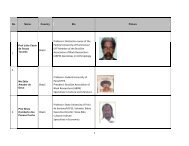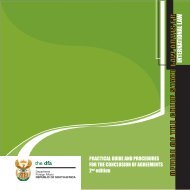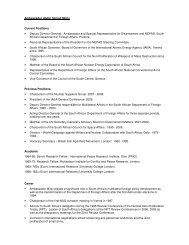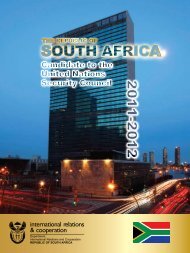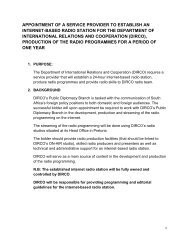Read more - Department of International Relations and Cooperation
Read more - Department of International Relations and Cooperation
Read more - Department of International Relations and Cooperation
Create successful ePaper yourself
Turn your PDF publications into a flip-book with our unique Google optimized e-Paper software.
80. Community policing is defined as a policing approach<br />
that seeks to form a reciprocal partnership<br />
between the community <strong>and</strong> police to improve<br />
levels <strong>of</strong> safety. The police <strong>and</strong> the community<br />
work together to identify problems <strong>and</strong> also to<br />
develop solutions. At the same time, the approach<br />
enables the community to hold the police<br />
accountable for the delivery <strong>of</strong> policing services<br />
that address their needs.<br />
restorative justice that promotes a victim-centred<br />
approach to criminal justice.<br />
Victim’s Charter <strong>of</strong> Rights<br />
78. This government initiative details the rights <strong>of</strong><br />
victims <strong>and</strong> minimum st<strong>and</strong>ards <strong>of</strong> service that<br />
victims are entitled to when they require assistance.<br />
The Charter provides guidelines on how<br />
victims may exercise their rights in practice <strong>and</strong><br />
contains contact details <strong>of</strong> entities that can assist<br />
victims.<br />
Anti-rape strategy<br />
79. All departments are encouraged to participate in<br />
the Interdepartmental Management Team (IDMT)<br />
for the Rape <strong>and</strong> Sexual Offences Programme.<br />
This programme focuses on prevention, as well<br />
as improving criminal justice responses <strong>and</strong> support<br />
to victims <strong>of</strong> sexual <strong>of</strong>fences. One focus area<br />
<strong>of</strong> the IDMT is to oversee the roll-out process <strong>of</strong><br />
the Thuthuzela Care Centres (TCC). The aim <strong>of</strong><br />
these care centres is to better protect the rights<br />
<strong>of</strong> women <strong>and</strong> children by providing support to<br />
victims <strong>of</strong> domestic violence, sexual violence <strong>and</strong><br />
abuse. TCCs provide improved services (health<br />
<strong>and</strong> welfare) <strong>and</strong> initiate processes for effective<br />
reporting <strong>and</strong> prosecuting <strong>of</strong>fences in a dignified<br />
<strong>and</strong> caring environment. The services are <strong>of</strong>fered<br />
to victims in a one-stop centre staffed with qualified<br />
pr<strong>of</strong>essionals.<br />
Community policing<br />
81. Further<strong>more</strong>, the formation <strong>of</strong> CPFs as outlined<br />
in the South African Police Service Act ,1995<br />
responds to the constitutional imperative <strong>of</strong> section<br />
199 (8) <strong>of</strong> the Constitution <strong>of</strong> the Republic <strong>of</strong><br />
South Africa which argues for transparent <strong>and</strong><br />
accountable oversight to be outlined in national<br />
legislation. The South African Police Service Act<br />
outlines the functions <strong>of</strong> CPFs as follows:<br />
• Establishing <strong>and</strong> maintaining a partnership<br />
between the community <strong>and</strong> the Service<br />
• Promoting communication between the Service<br />
<strong>and</strong> the community<br />
• Promoting cooperation between the Service<br />
<strong>and</strong> the community in fulfilling the needs <strong>of</strong><br />
the community regarding policing<br />
• Improving police services to the community<br />
at national, provincial <strong>and</strong> local levels<br />
• Improving transparency in the Service <strong>and</strong><br />
accountability <strong>of</strong> the Service to the community<br />
• Promoting joint problem identification <strong>and</strong><br />
problem-solving by the Service <strong>and</strong> the community.<br />
82. In view <strong>of</strong> the above, an enabling framework to<br />
support partnership policing has been developed.<br />
The aim <strong>of</strong> this framework is to manage <strong>and</strong> guide<br />
the implementation <strong>of</strong> diverse partnerships within<br />
the various structures <strong>of</strong> the SAPS. In addition,<br />
the framework seeks to ensure the implementation<br />
<strong>of</strong> partnerships,which are accountable <strong>and</strong><br />
productive to the strategic objectives <strong>and</strong> direction<br />
<strong>of</strong> the law enforcement agencies <strong>of</strong> the Republic.<br />
This also entails setting up a st<strong>and</strong>ardised<br />
structure which allows synergy <strong>and</strong> collaboration<br />
among all key parties within partnership initiatives.<br />
These key parties may involve the provinces,<br />
police stations, government departments,<br />
non-governmental organisations, businesses <strong>and</strong><br />
community police forums. The framework will<br />
further facilitate <strong>and</strong> guide specific output-driven<br />
partnerships such as those associated with sport,<br />
women, children <strong>and</strong> youth.<br />
Ke Moja (I’m fine without drugs) Programme<br />
83. An intersectoral programme drug dem<strong>and</strong> reduction<br />
programme informed by the National Drug<br />
Master plan programme has been in place since<br />
2007. An interdepartmental action plan to reduce<br />
drug abuse, focusing on youth, was launched<br />
18





